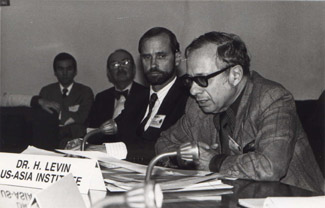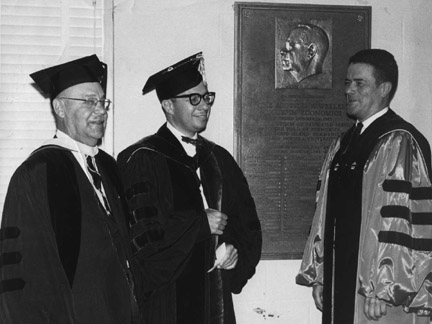|
THE WORK HJL Collections Bio Papers & Publications |
THE VISION Main Page Invisible Resource Harvesting the Invisible Resource |
THE MAN HJL Collection Exhibit Guide to HJL Collection Obituaries |
THE LEGACY Tributes HJL Public Policy Workshop Additional Personal Materials |
Related… Issues & Events Groups Colleagues |
A LOOK BACK: THE WORLD'S FIRST KNOWN COMMUNICATIONS ECONOMIST

The Harvey J. Levin Papers chronicle
the professional and civic life of communications economics pioneer
Harvey J. Levin, and
are available to researchers and the general public at Hofstra
University Archives and
Columbia Institute for Tele-Information.
Dr. Levin, an internationally known economist and
longtime holder of the Augustus B. Weller Chair at Hofstra
University, died of heart failure at his home in Garden City, Long
Island, on April 30, 1992.
He was 67.
For forty years spanning five decades, as the
world's first known communications economist, Dr. Levin
researched,
published and
proposed innovative economic and regulatory solutions that
anticipated -- and later addressed -- the problems of competing
rights and access to the airwaves, or electromagnetic field, and its
overuse and congestion. A frequent consultant to
federal governmental agencies,
he was the first to propose the auctioning of broadcast frequencies
as a means of utilizing the airwaves as a natural resource and
diversifying their allocation globally and equitably. His visionary
work anticipated the evolution of television, satellites, cellular
telephones, electronic remote boxes and wireless internet, and their
demands on increasingly congested airwaves.

Testifying for U.S.-Asia Institute, 1970s
Back before satellite antennas and electronic
remotes were household appliances, when wireless services were
something out of a James Bond movie and cell phones existed only in
secret agent Maxwell Smart's "shoe phone", Dr. Levin's
proposals were considered
"far out". Most observers didn't even consider the airwaves a
resource and likened his concerns to those in "Star Trek". It
inspired the name of Dr. Levin's pathbreaking 1971 book,
The Invisible Resource -- Use and Regulation
of the Radio Spectrum, which
revolutionized the field.
For twenty-five years, Hofstra's
Weller Chair -- the
first fully endowed professorial chair on Long Island -- made Dr.
Levin's research and publication possible. Consequently, in 1995,
three years after his death, the Federal Communications Commission
began implementing his longstanding proposals, which culminated in
the
U.S. Telecommunications Act of 1996.
"...I have many opportunities to be
'bruised'. And I'm pleased to be bruised. I don't mind at
all. And sometimes in the bruising process, I hear a couple of
nice things such as, 'Well, if you kept doing this for another
thirty years, you might get through.' And my answer is, you
know, I don't have a particular time horizon... Indeed, I'm
rather optimistic. I've seen a lot of developments... And so I
think we're moving, though we might be moving in a very slow
way."
-- Harvey J. Levin
at the National Research Council/National
Academy of Sciences, June 15, 1987
Dr. Levin joined Hofstra's Economics Department in
1955, served as its chairman from 1961 to 1963, held the Weller
Chair from 1964 to 1989, founded and directed the
university's
Public Policy Workshop
from 1975 until his death, and served as University Research
Professor.
|
|
|
Receiving Weller Chair from Hofstra President Clifford Lord and Augustus Weller, September 23, 1964 |
He was a longtime Garden City resident and lifelong
Long Islander. He was also an outspoken
advocate for progressive causes, with Long Island
community groups including the Long Island Coalition for Fair
Broadcasting (Honorary Advisory Board), the Long Island Alliance for
Peaceful Alternatives, the Long Island Area Council of Unitarian
Universalist Societies (Social Concerns Committee), the Unitarian
Universalist Church of Central Nassau (Man in Crisis Committee), and
the Garden City Jewish Center and Malverne Jewish Center (Social
Action Committees.)
A memorial service for Dr. Levin was held at Hofstra
on May 19, 1992. His legacy is honored by Hofstra's
Levin Collection, the
Harvey J. Levin Public Policy Workshop,
and the
H.J. Levin Communications Economics Website
(www.harveyjlevin.com).
"Conservatives call
for PBS to go private or go dark... With a Senate
appropriations bill as the battleground, public television is
facing the bitterest political opposition in its history in a
struggle that public television executives say could threaten
the future of the Public Broadcasting Service."
-- The New York Times,
April 30, 1992
(cover story the last day of Dr. Levin's life)
(cover story the last day of Dr. Levin's life)

|
THE WORK HJL Collections Bio Papers & Publications |
THE VISION Main Page Invisible Resource Harvesting the Invisible Resource |
THE MAN HJL Collection Exhibit Guide to HJL Collection Obituaries |
THE LEGACY Tributes HJL Public Policy Workshop Additional Personal Materials |
Related… Issues & Events Groups Colleagues |

